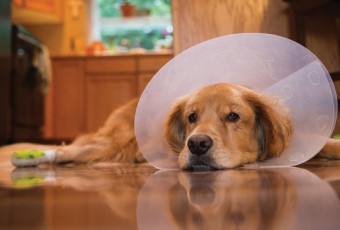VACCINATION . . .
Wow … this is a word that elicits a whole range of responses. It’s become such a polarizing word! On one hand, it’s common knowledge that vaccines are powerful medications that can prevent
serious or life threatening disease. We rally behind charities and organizations that bring vaccines to impoverished countries where children get very little health care. Yet a lot of us get squeamish when we think about vaccinating our own children. I thought about how bizarre my behavior was one day, after stuffing some money into a donation box for an international children’s charity. I was willing to pay for someone else’s child to be vaccinated, yet felt guilty and reluctant to vaccinate my own! Even more bizarre is that I confidently vaccinate pets everyday, knowing these pets and their
families will be safer and healthier because of it. But as a veterinarian I see the anxious, guilty look on the fur-parents face as they ask “Are these vaccinations safe? Are these shots necessary?.” The same look I have on MY face as I ask my family doctor the same questions about vaccinating my kids.
So, maybe it’s not that bizarre, but actually really complicated. Vaccinology (my made up word for the decision to vaccinate) is not an exact science, but an attempt to balance risks and benefits. If a vaccine was 100% safe all the time, in every patient, and the disease it prevented was life threatening and really common – than giving the vaccine would be a really easy decision, a no-brainer. However, most of the times it’s not that cut and dry. The vaccines I recommend for my cat and dog patients have been rigorously tested for safety. However, certain individuals within the pet population may still have sensitivity to that vaccination (that sensitivity might be a result of something in the vaccine itself, or another illness or treatment that pet is going through). Also, the diseases I recommend vaccinating for are a serious threat, some even life threatening. But due to the success of widespread vaccination, several of the diseases have now become pretty uncommon.
There is a concept called HERD IMMUNITY – where if a high enough percentage of a population is vaccinated than the chance of two animals that are unvaccinated and sick coming in contact with each other is really rare. Basically it means even when a pet is unvaccinated it is effectively protected against disease – because enough pets around them ARE vaccinated. Different factors will influence what the percentage is of animals that need to be vaccinated to achieve herd immunity, but it’s usually around 70%. If the number of vaccinated animals gets too low (below the herd immunity percentage) than the chance of animals getting sick, or even an outbreak, increases.
So all the pets in Chatham-Kent could be considered part of a herd. When making vaccination recommendations, veterinarians, like myself, consider the severity of the disease, how common it is (factoring in health of the whole herd), and how well the vaccine works. Then, for each individual pet, I must also understand their overall health and lifestyle (example farm dog vs. city dog), as many different factors will impact how likely they are to be exposed to different diseases.
So that process is not very exact and requires judgment. It can also cause a lot of anxiety and confusion for pet owners.
Here’s the good news – when it comes to one particular disease, the decision is very straightforward.
RABIES is a fatal disease in wildlife, pets, farm animals, and people. In Canada, bats, foxes, and skunks are the most common transmitters of the disease. Even scarier – it cannot be diagnosed until after the victim has died. Rabies vaccine is safe and will protect your pet AND your family. Fear over unnecessary and over-vaccination has caused the validity of rabies vaccination to be questioned. This creates a very real (and unnecessary!) danger to pets and the human family with whom they live. Owners wanting to spare their pet the potential risk of a vaccine-related reaction not only put their pets’ life in danger, but their own (and their family, and the community).
Any controversy that surrounds the risks and benefits of vaccinations for pets should not apply to RABIES and here’s why.
RISK – Any risk is too much risk. Rabies, fortunately, is not a very common disease, which means the chance of your pet getting exposed is low. Alarmingly though, there have been cases of a few different strains in South Western Ontario, just in the last couple months. In Hamilton, at least four rabid raccoons have been identified with a strain that has not been seen in the province in 10 years. One of these raccoons was diagnosed after fighting with two dogs from the same household and biting their faces. These dogs were not vaccinated and will live in quarantine, away from their family, for several months, at least, until it has been determined if they contracted rabies. In January, a cow in Perth County was also diagnosed after it was found dead.
Do we really know how much Rabies is out there? Although it is law that Rabies cases be reported to the federal government, the task of testing and managing suspected cases has been cast off to municipal health units. Testing for Rabies is expensive and, in Chatham-Kent, animals are generally only accepted for testing if there has been a human exposure. Very likely, the recently reported cases only represent a portion of the number of rabies-infected animals in Ontario. Pets of all lifestyles are at risk: city pet, farm pet, even those that live in apartments or strictly indoors. Bats often get into houses and buildings, and have tested positive for rabies more than any other animal. No effective vaccine program exists for this species. City life is very successful for skunks and raccoons, putting city pets at risk in their own backyard.
HERD IMMUNITY will not reduce your pets’ risk of exposure like some other diseases, because the most likely source of infection is wildlife, not a dog or cat. So even if all the other pets in your neighborhood have been vaccinated, your pets’ risk of contracting rabies stays the same.
Another very important feature of rabies vaccine to consider, which makes it different from the others… It is the LAW! A law that successfully made rabies an uncommon disease in Canada, through vaccination of pets and vaccine bait programs for wildlife.
Your veterinarian is going to be the best source of information regarding the safest and most effective vaccination protocol for YOUR pet. If you have concerns about your pets’ risks with vaccination or rabies exposure, you ARE asking the right questions – and discuss them with your veterinarian. Different vaccine strategies can be an option for pets with a high risk of exposure or vaccine sensitivity. For more information on rabies and the incidence in Canada, visit ontario.ca or inspection.gc.ca
Dr. Emily moved from Saskatchewan to Chatham-Kent in 2003. Dr. Emily recalls, “I moved here to be part of a fantastic team at this exciting progressive veterinary hospital. And now we love it here! The people are friendly and have small town values. It means a lot to be able to raise my children in a place where they can benefit from both rural and urban community.”



